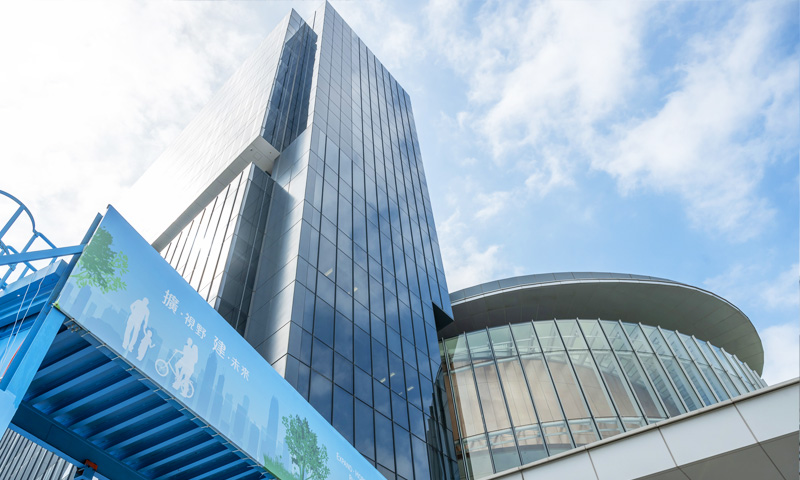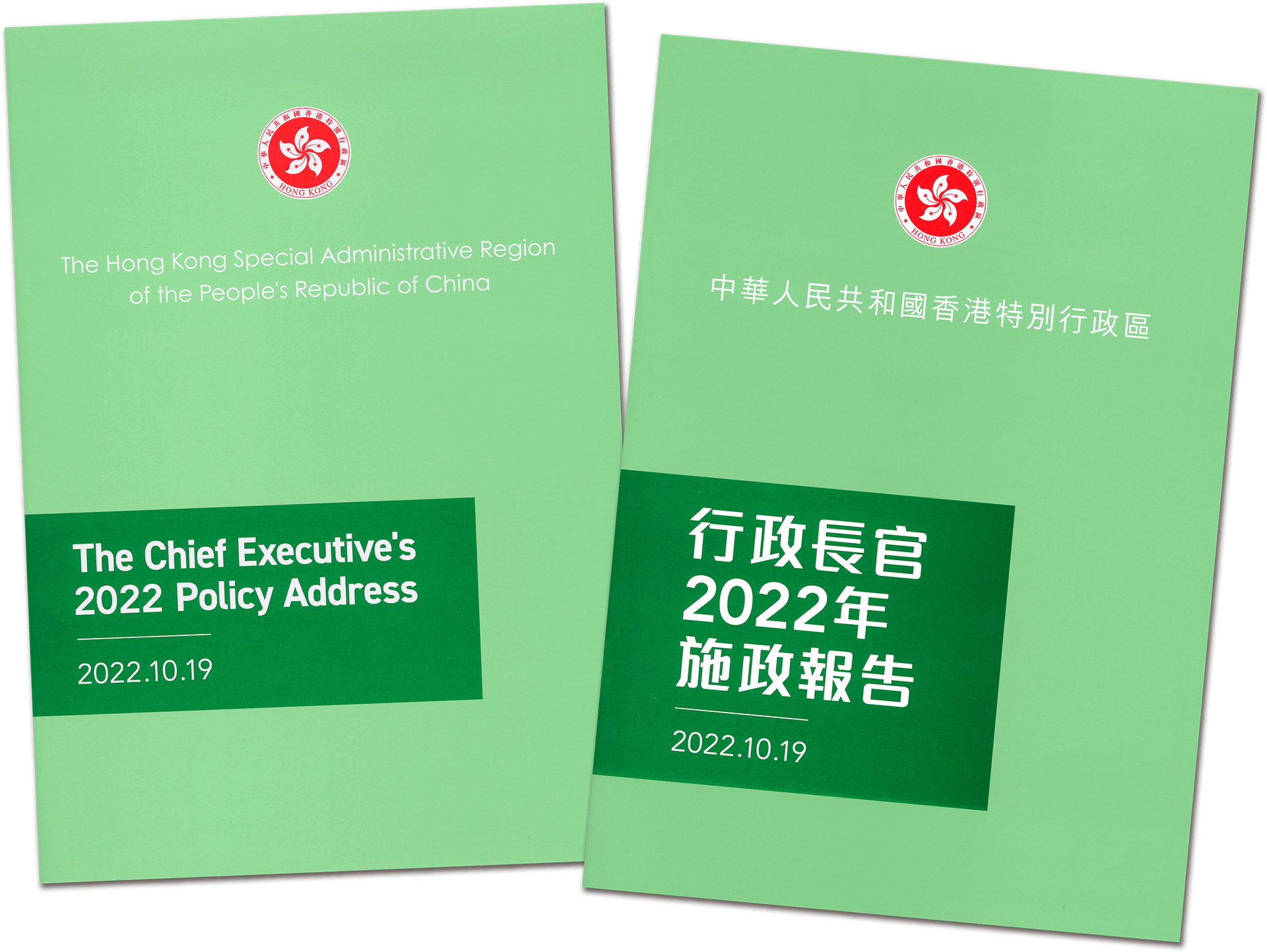The Legislative Council
Annual Report 2022
Introduction
Meetings of the Legislative Council (“LegCo”) are open to the public and may be conducted in Cantonese, English or Putonghua, with simultaneous interpretation and sign language interpretation. The proceedings of Council meetings are broadcast live on the Council’s website, reported by the mass media, and recorded verbatim in the Official Record of Proceedings of LegCo. The business transacted at regular Council meetings mainly includes tabling of subsidiary legislation, papers and reports; asking of questions for replies from the Government; consideration of bills; and debates on motions.
Council meetings held
(the 2022 session began on 12 January 2022 until 23 December 2022)
(the 2022 session began on 12 January 2022 until 23 December 2022)
331
(including five Chief Executive’s Question and Answer Sessions)
(including five Chief Executive’s Question and Answer Sessions)
Meeting hours
264
Tabling of subsidiary legislation, papers and reports
Subsidiary legislation refers to any proclamation, rule, regulation, order, resolution, notice, rule of court, bylaw or other instrument made by designated authorities under or by virtue of relevant ordinances and having legislative effect. Such legislation is subject to the Council’s scrutiny through a positive or negative vetting procedure. Members or public officers may move motions in the Council to amend subsidiary legislation.
Papers tabled in Council include annual reports of government departments and public bodies, as well as reports of the Council’s committees. Members and public officers may address the Council on these reports.
Subsidiary legislation subject to negative vetting tabled
183
Papers and reports tabled
186
Questions
Any Member may address questions to the Government on its work, either seeking information on a particular matter or asking for official action with regard to that matter. The Member must specify whether an oral or a written reply is required. For questions seeking oral replies, supplementary questions may be put by any Member to request further elaboration after the public officer has replied. Members may, with the President’s permission, ask urgent questions on the ground that they are of an urgent character and relate to matters of public importance.
Oral questions
114
Supplementary questions
634
Written questions
413
Urgent question
1
Bills
The Government is primarily responsible for proposing new legislation or amendments to existing legislation in the form of bills for consideration by the Council. Subject to certain conditions, Members may introduce bills into the Council. A bill has to be given three readings for its passage by the Council. A copy of every bill passed by the Council, certified as a true copy by the Clerk to the Legislative Council, shall be submitted to the Chief Executive for signature.
Bills introduced
• By the Government: 25
• By Member: 0
• By Member: 0
Bills passed
• Government bills with amendments: 9
• Government bills without amendment: 8
• Government bills without amendment: 8
Bill negatived
• Government bill: 0
• Member's bill: 0
• Member's bill: 0
Motions
Motions are a mechanism through which most Council business is transacted. Consideration of a bill takes place by way of a series of motions moved, debated and voted upon by Members. Amendments to bills and approval for or amendments to subsidiary legislation subject to positive vetting are effected through motions. Subsidiary legislation subject to negative vetting may also be amended by way of motions.2
• Moved: 12
• Passed: 12
• Passed: 12
Members may move motions including those seeking the Council’s approval for (a) exercising the Council’s power under Article 75 of the Basic Law to amend the Rules of Procedure (“RoP”); (b) authorizing under the Legislative Council (Powers and Privileges) Ordinance (Cap. 382) that meetings of the Council or a committee may be conducted remotely; (c) matters provided for under The Legislative Council Commission Ordinance (Cap. 443); (d) amendments to the terms of reference and names of relevant Panels under RoP; or (e) procedural matters.
In addition, Members may debate motions not intended to have legislative effect. These debates provide opportunities for Members to express views on issues concerning public interest and call on the Government to take actions. Such motions include motions moved under RoP 16(2) or 16(4) for the adjournment of the Council for debate on issues of urgent public importance or concerning public interest.
• Moved: 1
• Passed: 1
• Passed: 1
• Moved: 1
• Passed: 1
• Passed: 1
• Moved: 1
• Passed: 1
• Passed: 1
• Moved: 1
• Passed: 1
• Passed: 1
• Moved: 1
• Passed: 1
• Passed: 1
• Moved: 33
• Passed: 30
• Passed: 30
• Moved: 1
• Not voted: 1
• Not voted: 1
-
Motions with legislative or binding effect may be called “proposed resolutions”.
Requests for leave of the Council to give evidence of Council proceedings
Requests for leave of the Council to give evidence of Council proceedings under section 7 of the Legislative Council (Powers and Privileges) Ordinance (Cap. 382) and Rule 90 of the Rules of Procedure (“RoP”) shall be submitted to the Clerk to the Legislative Council and placed on the Agenda for a Council meeting as appointed by the President. Unless on a motion moved by a Member the Council determines that such leave be refused, the Council shall be deemed to have ordered that such leave be granted. Where the request for leave of the Council is sought during any recess or adjournment or dissolution of the Council, such leave may be given by the President under section 7(2) of Cap. 382 and RoP 90(4).
Request for leave: 1
Leave requested by the Department of Justice was granted at the Council meeting on 14 December 2022 for seven officers of and persons employed by the Council to give evidence in the criminal proceedings of HKSAR v JINN Mina (Case No. ESCC 619/2022).
Policy Address debate
The Chief Executive (“CE”) delivers a Policy Address to the Council annually. The Chairman of the House Committee moves a motion to thank CE for the Policy Address (“Motion of Thanks”) at a Council meeting held after the address. A debate follows, with Members giving views on the Policy Address and public officers responding to such views.
Delivery of the 2021 Policy Address (2020-2021 legislative session)
6 October 2021
Debate on Motion of Thanks
16 to 18 February 20223
Voting on the Motion
18 February 2022 (passed)3
Delivery of the 2022 Policy Address
19 October 2022
Debate on Motion of Thanks
16 to 18 November 2022
Voting on the Motion
18 November 2022 (passed)
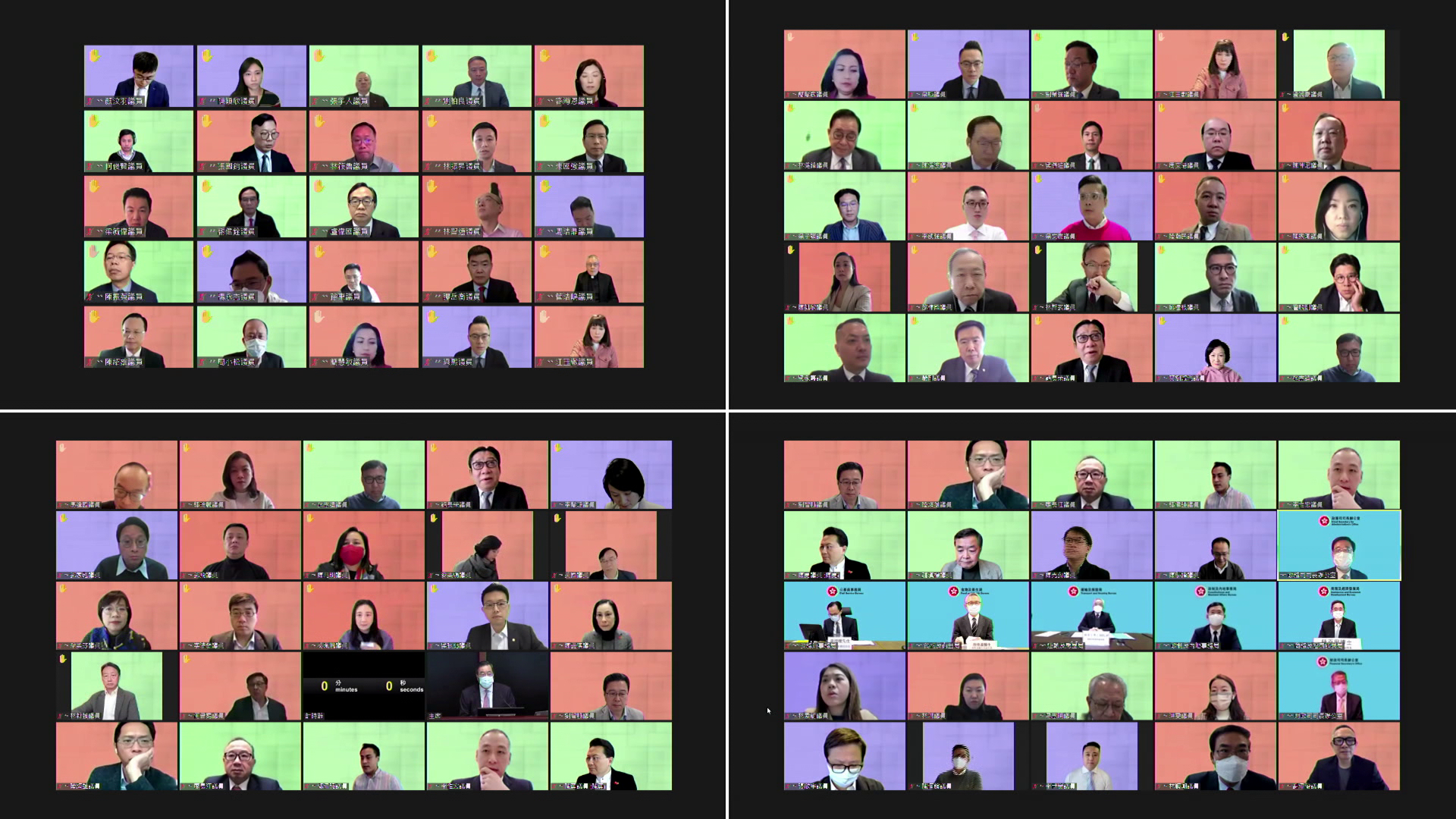
Members debate the 2021 Policy Address after the Motion of Thanks is moved at the remote Council meeting by videoconferencing on 16 February 2022

The sixth-term Chief Executive, Mr John LEE Ka-chiu, delivers the 2022 Policy Address, themed “Charting a Brighter Tomorrow for Hong Kong”, on 19 October 2022
Members of different political affiliations give media briefings to express their views on the 2022 Policy Address
Budget debate
Before the end of a financial year on 31 March, the Financial Secretary presents to the Council his Budget for the next financial year commencing on 1 April in the form of an Appropriation Bill and the Estimates of Expenditure. After the Finance Committee has examined the proposed Estimates of Expenditure at its special meetings, the Appropriation Bill is brought back to the Council for consideration and decision. The Finance Committee held eight special meetings between 8 to 14 April 2022 to examine the 2022-2023 Estimates of Expenditure.
No amendments were proposed to the Appropriation Bill 2022 (“Bill”). The Budget debate lasted for two meetings.
Bill introduced
23 February 20224
Resumption of Second Reading debate on the Bill, consideration by committee of the whole Council and Third Reading
27 and 28 April, and 4 May 2022
(two meetings)
(two meetings)
Bill passed
4 May 2022
The Chief Executive’s Question and Answer Sessions
Five Council meetings were held in January, March4, June, July and October 2022, at which the Chief Executive addressed the Council and answered Members’ questions on the work of the Government.
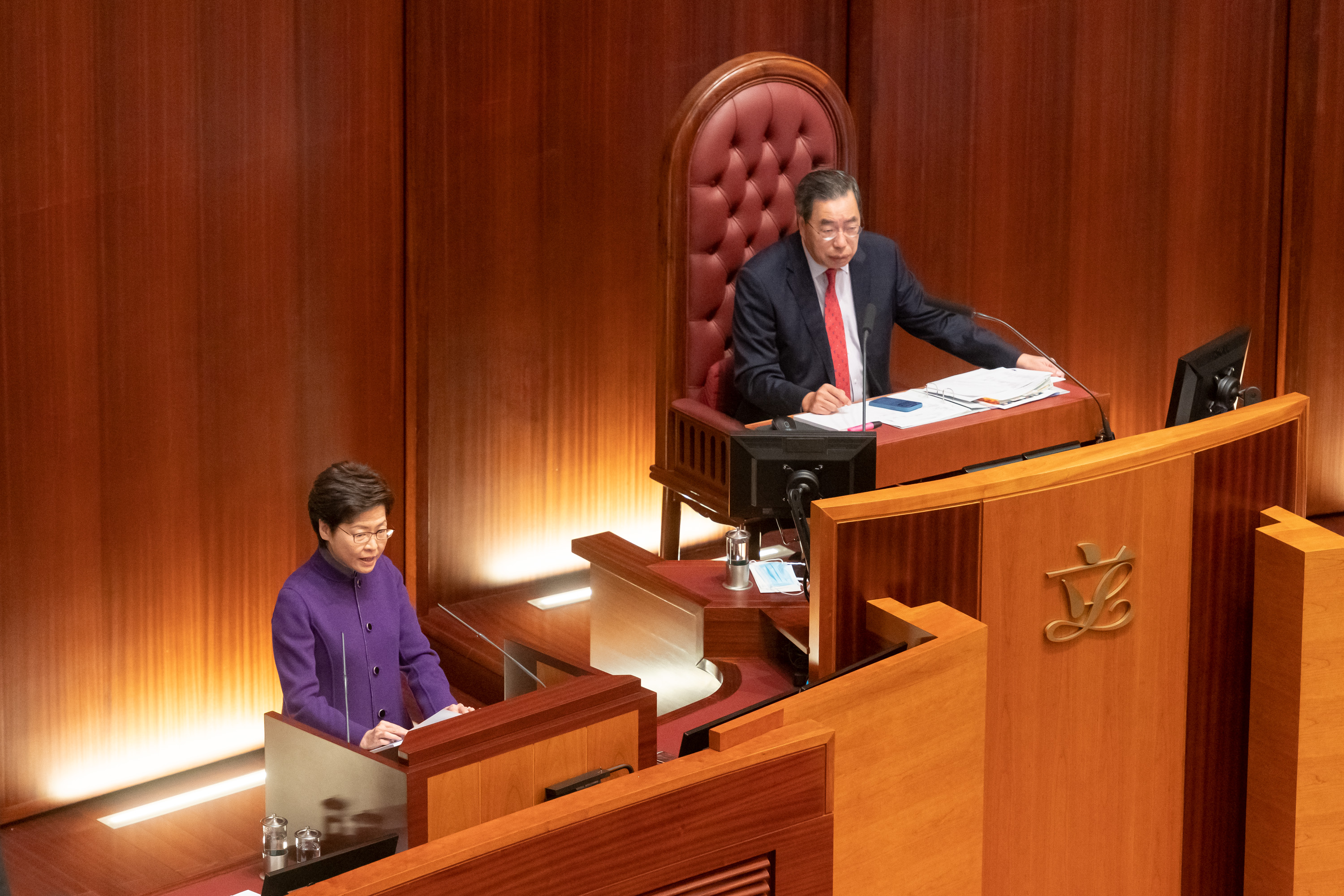
The fifth-term Chief Executive, Mrs Carrie LAM CHENG Yuet-ngor, attends a Chief Executive’s Question and Answer Session
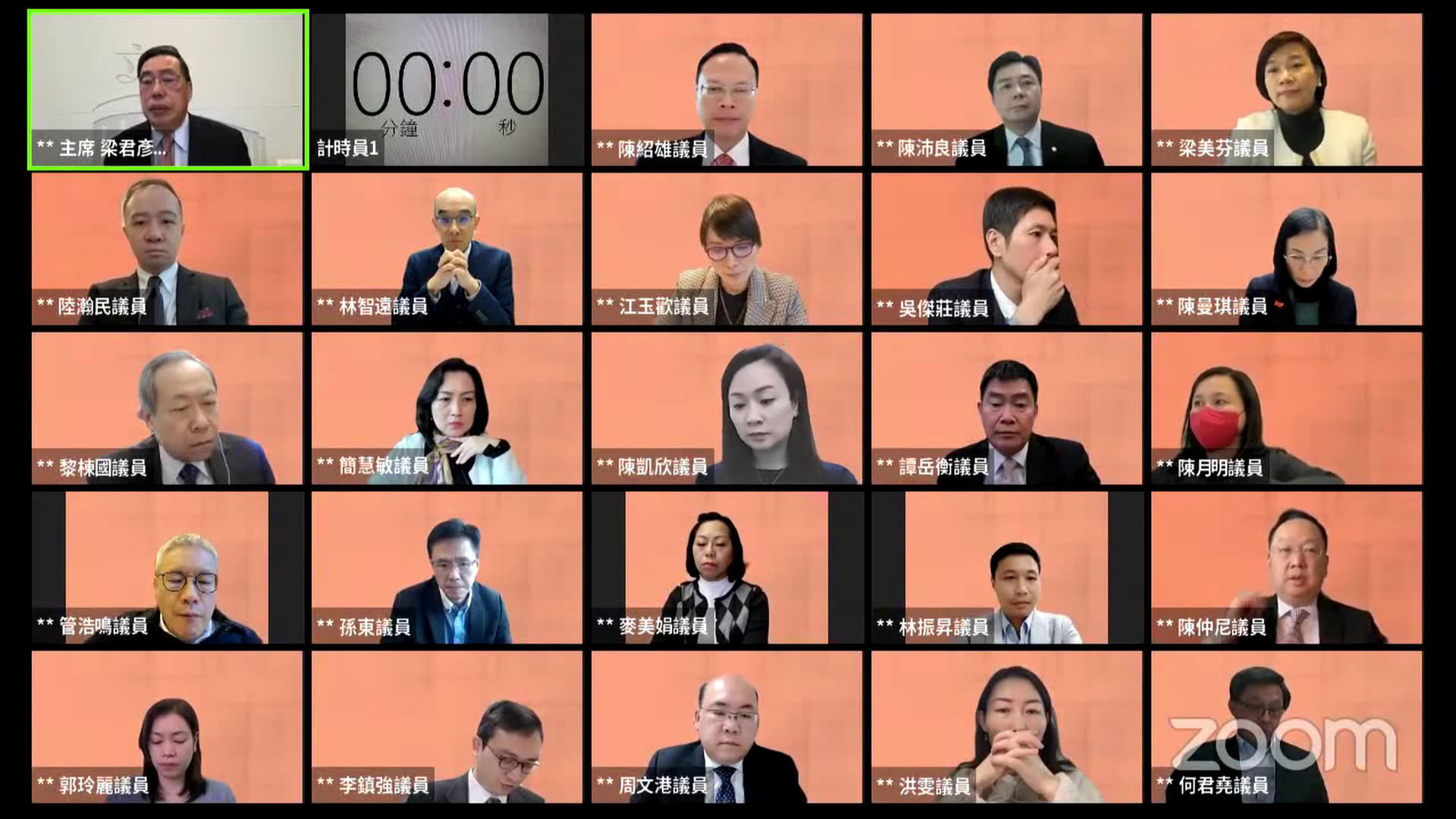
Members attend a remote Chief Executive’s Question and Answer Session by videoconferencing on 23 March 2022 to raise questions on the work of the Government

The sixth-term Chief Executive, Mr John LEE Ka-chiu, attends a Chief Executive’s Question and Answer Session
-
Meeting held remotely by videoconferencing.
Introduction
Introduction
Tabling of subsidiary legislation, papers and reports
Questions
Bills
Motions
Requests for leave of the Council to give evidence of Council proceedings
Policy Address debate
Budget debate
The Chief Executive’s Question and Answer Sessions

